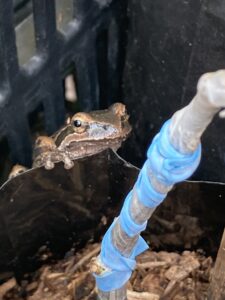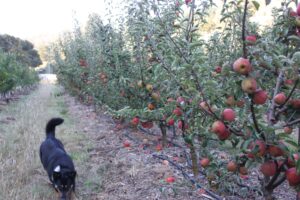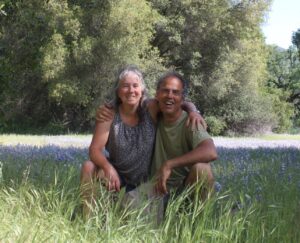
Ellen Baker and Freddy Menge live in Santa Cruz County, California, with their family, their dog, cow (edit: we no longer have a cow), and too many chickens. That’s us. We have been obsessed with growing and foraging fruit on the California’s central coast for over 30 years, nurtured by our association with the Monterey Bay Chapter of the California Rare Fruit Growers. Straying from a primarily pomme fruit focus, we have lately felt compelled to pursue a new love: avocados. We became indignant when confronted with the fact that avocado tree varieties in Northern California nurseries are strictly dictated by the commercial market. There is no source for connoisseur quality, exceptional, and unusual varieties, although those varieties certainly do exist in collections belonging to U. C. Irvine and others. The problems we encountered acquiring some of the great cultivars provoked us to start a nursery dedicated to righting this wrong. We welcome you to Epicenter Nursery, our attempt to share some of our avocado excitement with the rest of the state.
It’s fun to read this previous statement written over a decade ago. So much of it still tracks with what we believe and what we’re doing. Not that there haven’t been some pretty major modifications happening with the nursery. We’ve changed our pots several times, increasing the aeration, reducing the size and water-logability. We’ve reduced the wood in our mix, changed the way we graft and stake the young trees, changed the way we fertilize and water. We change things constantly to try to grow better trees.
The change we are most excited about is that we are abandoning the bulk of our former business model.
We have come to see that many of the venerable old (mostly B-flowered) varieties just don’t work in our climate. We have been propagating Hellen, Queen, Edranol, Nabal, Nimlioh, Sharwil, Daily 11, Malama for years. They are exceptionally good avocados in the specific geographical situations to which they are suited, but they don’t produce in our area. We can’t recommend them to our local customers, but instead need to rely on the increasingly untrustworthy services of UPS to ship them to areas where they do perform well.
That is not the sort of business we want to be in.
Luckily, a lot has changed since we started propagating avocados almost 20 years ago. For a time, we were the only nursery growing some of these types, so if you wanted a Malama, or a Daily 11, you had to ask Julie Frink, or come to us. Now that avocados have become cool, there are numerous outfits propagating these heirloom types, many of them in Southern California where they will actually produce fruit.
We say, let them have that business!
The impetus of our change, the reason why we need to drop the famous B-types is that there are some new A-type avocados that produce really well, with flavor that rates in the top tier. Our nursery is small, we want to produce these exciting new types, and something had to give. We have made a choice to propagate the best avocados available to us, and refuse to give the space to old types better suited to southern California (though we will propagate some of the iconic types on a “by request” basis).
There are some “Name Brand” avocados we are still excited about. The Carmen Hass, Lamb Hass, Reed, Gem, Gwen, Don Gillogly, Ardith, Jan Boyce have all proven themselves to be high producers of excellent quality fruit here, locally. We are proud to stand by these types, but also need to express our belief in some of the new finds as well.
It’s going to take all the capacity we can muster to begin to satisfy demand for the profoundly good Santa Clara Gold, the super-fatty Bird Avenue, the bullet-proof productive Palo de Oro, the cold-hardy and delicious Bonny Doon, the super-tough D’Arturo.
Read the descriptions in our varieties section.
We need the space to fully evaluate potential winners like Bay Giant, double-cropping Bianca, the ultra-rich Calvin, the superb Bermudes’ Best. We need to increase the availability of avocados like Aravaipa, that will blow out the northern borders of avocado cultivation, and provide the quality and cold hardiness that will make us heros in the eyes of our customers.
The avocado world is catching up with the fig world. It’s apparent that unimaginably great avocados are growing away, unrecognized in some cases, and in others, just newly brought to our attention. For us, the excitement, the future of avocados and our future as a nursery lies in discovering and making available these great new varieties.
We can be reached by e-mail, using the form on the “Order Avocado Trees” page of this website.
Or by mail: 173 Alta Dr., La Selva, CA 95076. Please note: we are not open to the public on a daily basis. If you wish to visit, please contact us via e-mail first. Thank you.
Apple Orchard Profile:
Our orchard in Larkin Valley was planted in 2005, as an outgrowth of a runaway hobby/obsession with apples that hasn’t quite run its course. Once an old orchard, it was converted to horse pasture, then reverted to a wet meadow sitting at the bottom of a deep North-South running valley. Surrounded by walls of Redwood and Oak, a rangy tangle of willows up- watershed divides and transitions into hundreds of acres of rolling wild land.
Ours is a little chunk on the edge of a huge block of fairly pristine native habitat that supports a lot of wildlife. I see Cougars, Coyotes, Foxes, Bobcats. Deer, Wild turkeys, Eagles, Coopers, Red tailed and Red-shouldered hawks, 3 kinds of owls, and lots of gophers.
I can trap the gophers, and fence out the deer, but the coyotes are smart. They help with the gophers, but love pears a little too much. A battery of perches and boxes turn the Bluebirds, swallows, chickadees and raptors into charismatic farm laborers.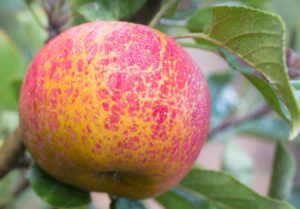
Deep distrust of synthetic chemicals leads me to avoid them on my farm and elsewhere, but we do use OMRI listed Pheromone ties against codling moth. No synthetic fertilizers or pesticides, no sulphur, copper, neem, or dormant oil are used, as all of these kill things we like. We do use mountains of leafy tree chips to conserve water and suppress weeds; composted animal manure for extra fertility. We don’t plow or disc between our rows, using a walk-behind high-weed mower to maintain a year-round mixed grass/weed/flower cover instead. What this means is we spend a lot of time on our hands and knees, pulling up bindweed to keep it from swallowing our trees.
Getting down to the apples, we try to grow European style, high flavor varieties. These differ from what’s commonly available in that they’re endowed with acidity, astringency, and aromatics. Combined with their high sugar, this makes for an intense, complex, high-impact eating experience. 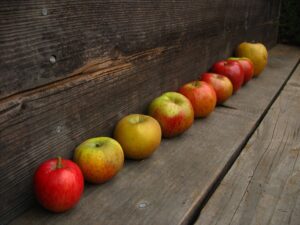
Not everyone shares our preferences, but luckily, it’s easy to find normal type apples.
After years of running public apple tastings, we’ve seen how people respond to high-flavored apples, and feel relieved and delighted to finally be able to provide the kind of fruit we love, directly to the public. We hope to attract an enthusiastic following of avid apple lovers, who will enable our behavior. Since farming is all about enormous amounts of boring, repetitive, and hard work, if we, and people like us, didn’t love our fruits, it would feel like a complete waste of time (though sometimes it still does).

